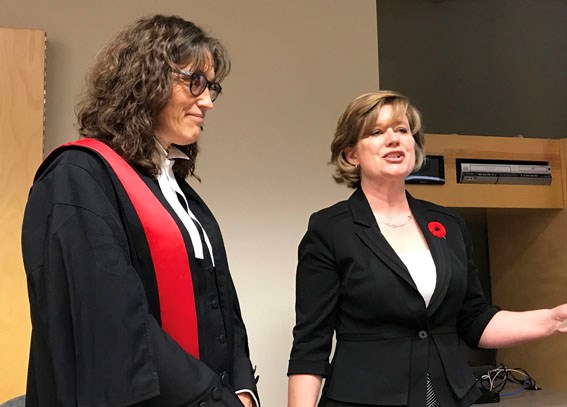The new Delta board of education could be heading into turbulent funding waters.
Trustees held their inaugural meeting Tuesday evening with Laura Dixon, Nick Kanakos, Val Windsor and Bruce Reid back to serve another four years alongside newcomers Daniel Boisvert, Erica Beard and Jessie Dosanjh. Once again, Dixon was unanimously voted as chair of the board for the coming year with Reid elected vice-chair.
In her address, Dixon touched on the need for continued advocacy when it comes province’s funding formula review, which is aimed at providing stable, equitable and predictable funding.
The financial picture has been made a little easier for the board over the past couple of years with enrollment finally stabilizing after a long period of decline. However, that doesn’t mean trustees won’t have to navigate through some potentially huge challenges, starting with the potential reduction in government funding with a new allocation formula.
Still under review with no details yet released, the new formula could result in boards like Delta, which have built up their own sources of revenue, penalized. The Delta board and B.C. School Trustees Association have been calling on the government for an assurance it won’t result in some districts benefiting at the expense of others, but the province has, so far, not offered any guarantee.
Dixon told the Optimist following Tuesday’s meeting that the province has only announced an advisory committee on the implementation of the new formula, but districts still have no idea what that draft formula looks like.
“If the original premise holds, which is to never talk about an increase in funding and only how we divide up the pie, there’s going to be winners and losers. That’s why we’re saying show us the draft,” she said.
Dixon noted the previous Delta board’s resolution, as well as letter from the BCSTA on the issue, will be delivered to Education Minister Rob Fleming this week.
She added several education partners, including the B.C. Teachers’ Federation, had already submitted a letter to the minister asking for a copy of the draft formula, with the teachers’ union last week having posted a copy of that letter on Twitter. Fleming responded, but only on Twitter.
“We’ve sent in letters and our response has only been something on Twitter? We haven’t had a meeting face-to-face. There’s a reason we go through the formality of a letter through the board chair,” Dixon added.
On Twitter, the minister’s replies included, “Once we have carefully considered all of the recommendations and implications, we will release the report.”
A review committee appointed by the ministry published the input it received during consultations. The review found there is not a great deal of consensus amongst districts on the most pressing issues, however, in general, boards do not want to lose funding through reallocation or have a “win” at the expense of another district.
As far as penalizing school districts like Delta that have generated their own revenues, the committee noted, “Locally-generated revenues are an important source of revenue for a number of school districts. However, not all districts have the same ability to generate revenues. While there were some suggestions for some sort of equalization to account for this, most districts felt that these revenues should remain outside the funding model.”
The ministry notes the new funding model is anticipated to be in place for the 2019/20 school year with information provided to boards early enough to support their next budget process.



